1968: A partial solar eclipse sparks a lifetime's interest
The total solar eclipse of 11 August 1999 entered most people's consciousness only a few weeks or months before the event. I had rather more warning than that: my interest in eclipses, along with a general interest in astronomy, goes back to the 1960's. I saw my first partial eclipse at home in September 1968. The sky was perfectly clear and the sight of the sun with a bite taken out of it had me enthralled. The recommended viewing method at the time was to look at the sun's reflection in a bucket of water, which I didn't find very satisfactory since any breeze disturbed the reflection. I got a better view through a piece of stained glass and, despite today's apocalyptic warnings, suffered no eye damage as a result.
At about this time I was given an astronomy book which listed the dates of eclipses up to the end of the century. When I read that there would be a total eclipse visible from Cornwall in 1999 I not so much as resolved as assumed that I would be there to see it. I realised that at the time of the eclipse I would have just passed my fortieth birthday - an unimaginable concept for a nine-year-old - and decided that I could safely leave the detailed planning until a little nearer the date.
One year to go: time to get organised...
It was not until 1998 that I took any positive action about the eclipse. The Internet was a great help in getting the information I needed. The NASA website in particular contained maps of the track of the eclipse, sweeping across Europe from southwest England to the Black Sea and on into the Middle East and India. Just as important was the information on weather patterns, and the story was not a happy one. Cornwall offered only a 40% chance of clear skies, with a slight improvement to 50% in southern Germany. Only in Eastern Europe was there a greater than even chance of getting a clear view. Furthermore, reports were emerging from Cornwall of fully-booked accommodation and inflated prices.
We had to consider that the eclipse would form part of our family holiday. Our normal practice was to travel by car and stay in self-catering accommodation, aiming to reach our destination within two days of driving. If we followed this custom, the furthest we could hope to reach was Germany - Stuttgart or Karlsruhe. We thought of flying to Munich, where Miriam's family have some friends who live south of the city, but did not feel able to invite ourselves to stay with them. A more intriguing possibility was to fly to Eastern Europe, but this would entail extra cost and, possibly, problems that we would not encounter in the West. We made some enquiries about accommodation in the Karlsruhe area but without success. The war in Kosovo broke out and made Eastern Europe seem much more dangerous. With only two months to go to the eclipse, we still had nothing booked.
Romania beckons
Then, suddenly, the war in Kosovo was over and we started to look seriously at the Black Sea. Miriam phoned an agency specialising in Romania and within a couple of days the booking was made. By the time my long-awaited fortieth birthday arrived, we knew we would be going to Romania; and the moon started on its last orbit before the eclipse.
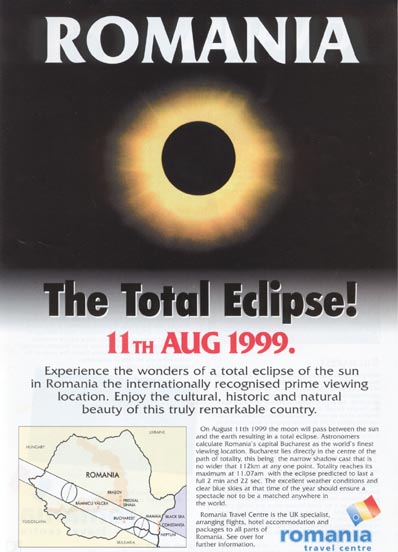
Total eclipse: a tourism opportunity for Romania
Romania
We flew from Heathrow to Bucharest on Sunday, three days before the eclipse. Our first hour in the country gave us a good idea of what to expect. We felt the heat as soon as we emerged from the plane; then we had to wait in a long queue to get our passports stamped with visas; and when we stepped out of the airport some young men grabbed our luggage, carried it to the waiting minibus and held their hands out for money.
We had booked to stay in the resort of Mamaia, which is essentially a long strip of hotels built on a sandbar stretching north from the major seaport of Constanța. It took a long minibus ride to get there from Bucharest and we were all tired on Monday. I spent the day researching the public transport options to get us into the narrow zone of totality.
On Tuesday, the day before the eclipse, we had a dry run. A half-hour trolleybus ride brought us to the railway station in Constanța, which also serves as a bus station and hosts a thriving market on its forecourt. As directed by the guide book, we headed round a corner to catch a bus heading south along the coast road. Our chosen destination was Mangalia, about 10 km north of the Bulgarian border (and probably about 20 km north of the centre line of the eclipse) which would offer over 2 minutes of totality. The bus we got on had seen better days - and much better roads, since it came from Germany - but it got us safely to Mangalia in about an hour.
Many of the Black Sea resorts are modern creations, but Mangalia is a seaport dating back to Greek times, and a significant town in its own right. It has its complement of hotels - indeed we discovered later that the best hotel, the President, had been booked solid a year in advance by a Japanese company. The town has a large beach fronted by the hotels, with the main square just behind them. At one end of the beach, overlooking a harbour, is a small park which looked a promising viewing site - quieter than the rest of the town, with some trees offering a bit of shade and some play equipment to occupy the boys. The town square was decked by banners and there was a stage and loudspeaker system set up at one end. Clearly they intended to make the most of the occasion.
Although we did not know it then, much of Europe woke up on Wednesday to cloudy skies and gloomy weather forecasts. In Mamaia there was not a cloud in the sky, but we were not home and dry yet. What if the entire population of Constanța - Romania's second largest city - crowded into the buses south, leaving no room for us? We set off early for the bus stop and found a large crowd milling around. To our surprise, we were able to squeeze on to the first bus that came along - and I do mean squeeze! We had to stand up all the way and hang on tight as the bus clattered along. I felt a sense of relief as we entered the zone of totality, and watched the distance markers count down the kilometres to Mangalia. After thirty years of waiting we were on our way to see the total eclipse.
Total eclipse
We arrived in Mangalia in brilliant sunshine about two hours before the start of the eclipse. The town was busy, but not yet crowded. As we headed for the park we saw wooden trellisses covered with straw being set up in the main square. Perhaps these would be lit to chase the darkness away during totality? The piles of charred wood we saw later confirmed this.
We established our base in the park and set up our modest observing equipment, consisting of a lightweight tripod, binoculars and some pieces of cardboard and white paper. Crude though it might be, our setup attracted a lot of interest. I had learned to be wary of strangers - most Romanians see foreigners as an opportunity to sell them something - and when a young man approached claiming to be a reporter I asked to see his press pass. He turned out to be a perfectly genuine reporter from the local paper in Constanța who had been sent to cover the occasion. He was very interested to discover a family who had come all the way from Birmingham to see the eclipse. To the delight of the boys ("We'll be famous!") we had our photo taken and our copy of the next issue of that newspaper is now a prized possession.
When I went up into the town to buy some drinks, I found that the main square, and indeed the rest of the town, was filling up fast. The atmosphere was most surreal, with electronic music booming from the loudspeakers and people wearing solar filters looking up into the sky, as if expecting to be picked up by an alien spacecraft. Every café and beer tent was full, and the roving solar filter vendors were doing a roaring trade.
It was quite a relief to get back to the park, out of range of the synthesised music, in time for the beginning of the partial phase. I called the boys over from the play equipment from time to time to follow the progress of the eclipse. Plenty of other people were watching and photographing our projected image and one man was intrigued to discover the existence of sunspots.
About half an hour before totality we noticed for the first time that the light level had dropped. The colours were normal, but I could look around without having to screw up my eyes in the sunlight. It's the sort of effect that can't be recorded by a camera or TV.
Totality approaches
There was a mounting sense of anticipation in the crowd as the bite out of the sun grew and grew. It continued to get darker as the projected image shrank to a crescent and was reduced to just a short line of light. Venus was now shining brightly in a deep blue sky and seagulls wheeled around as if night was about to fall. The diamond ring effect was greeted by shrieks, cheers and applause from the town square above us and everyone in the park clapped as the last vestige of sunlight disappeared and the corona shone around the disk of the Sun. It seemed to me that I could make out the jagged edge of the lunar mountains silhouetted against the brilliance of the solar atmosphere. It did not go completely dark - I had hoped to see Mercury and the brighter stars, but only Venus was visible - and there was a red twilight glow around the horizon. For over two minutes we stared in amazement at the hole in the sky. Then there was more applause and the hooting of ships' sirens for the return of the diamond ring. A few seconds later the corona disappeared and the moon's shadow swept out over the Black Sea towards Turkey.
It swiftly got lighter again and the crowds started to disperse. We dismantled the tripod, finished our picnic lunch and headed for the bus. Already solar filters were being discarded in the street. The party, and the experience of a lifetime, was over.
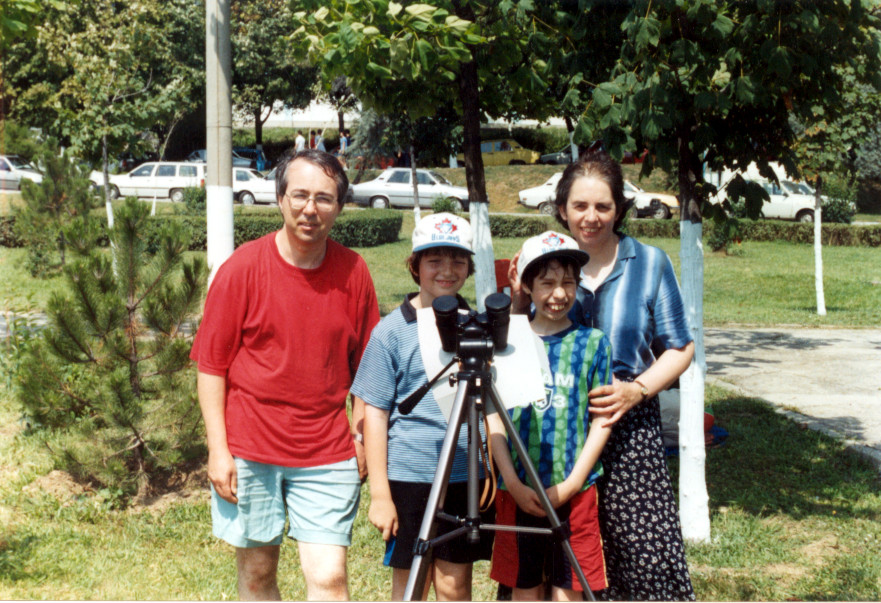
Ready to view the total solar eclipse: photo taken by a reporter from the local newspaper
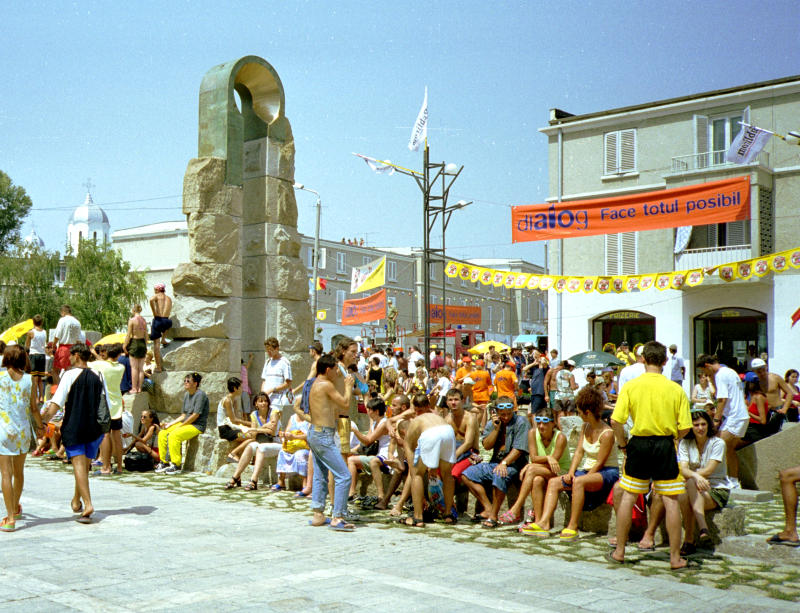
The crowds gather in the town square to view the eclipse
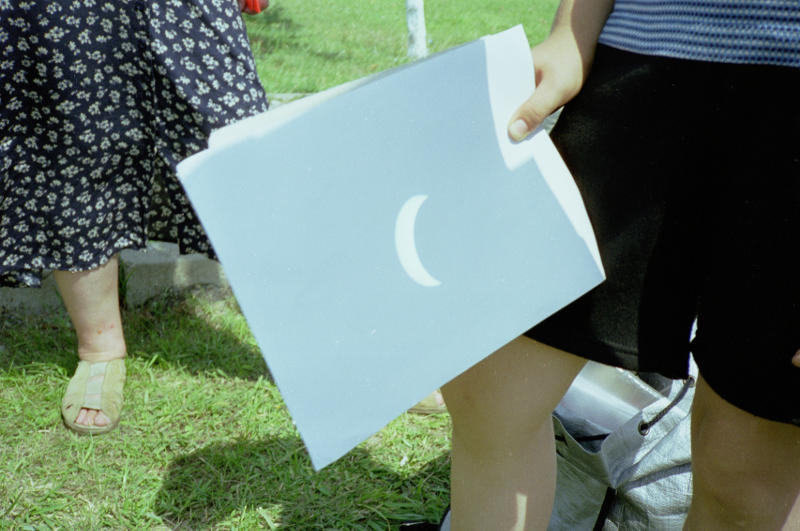
Projection of the sun, now just a crescent as the eclipse progresses
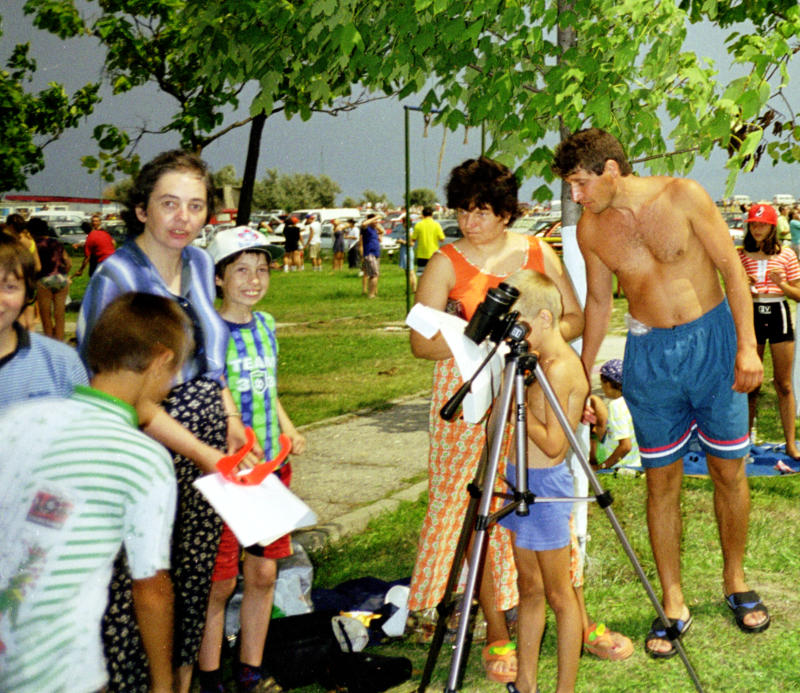
As the sky gets darker, curious onlookers view our projection of the sun
Afterglow
Anyone who has seen a total eclipse will confirm that it is awe-inspiring - truly one of nature's wonders. Observing it with such a large number of people certainly altered the experience. Somehow I was left with the feeling that the crowd had turned the tables on nature and had come to see it perform a party trick.
But so what? An eclipse is for everybody, and this one was a real gift to Romania, a country which has been through so many difficulties in the last few decades. It was the prime viewing site in Europe, having the best weather and the longest period of totality. As if to further the theme of astronomical bodies, Luciano Pavarotti gave an open-air concert in Bucharest that evening. We had to settle for the noise from the open-air discos in Mamaia, but it didn't matter. We were left with the enduring memory of that impossible halo-clad black disk hanging in the sky. A 30-year old ambition was achieved, and thanks to our humble equipment, we had the best and safest view of anyone in town.
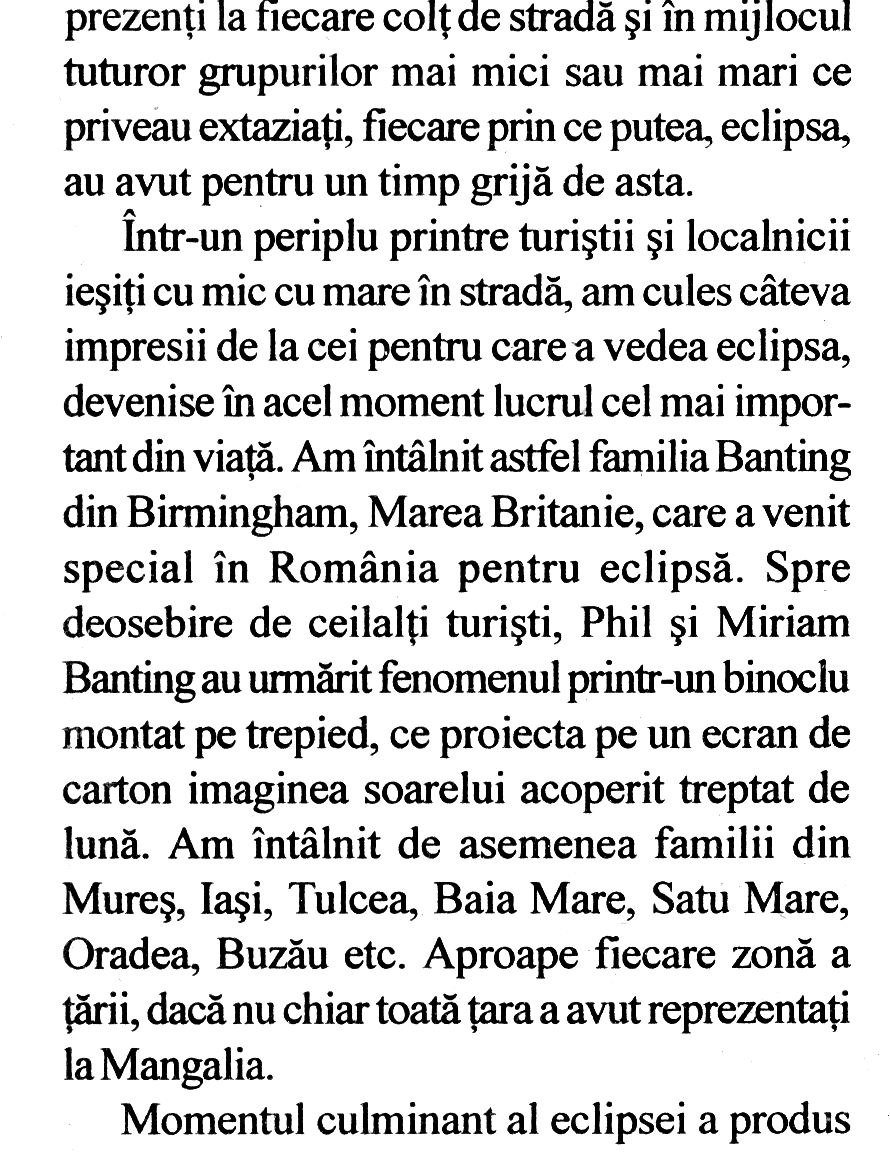
Our brief moment of fame in Romania